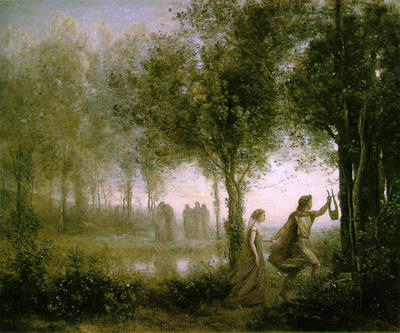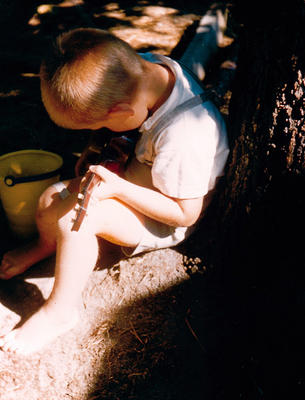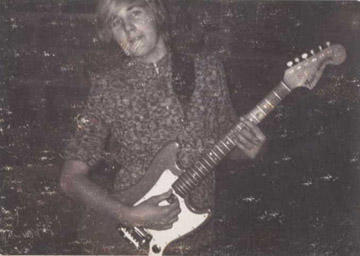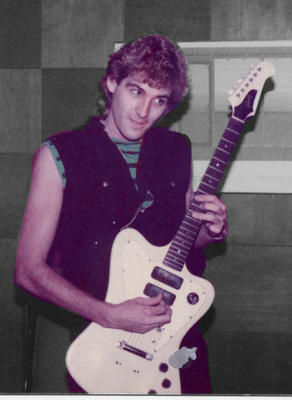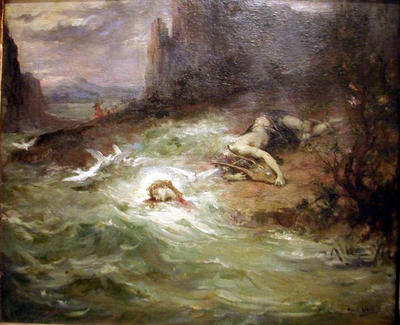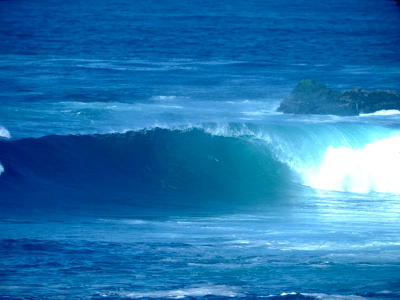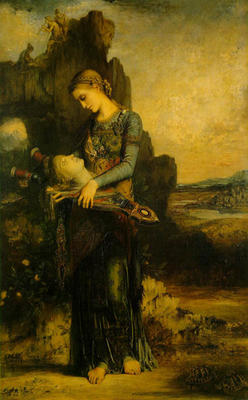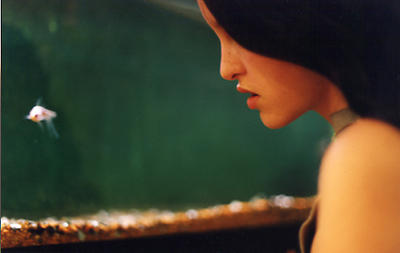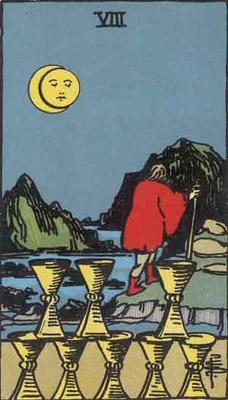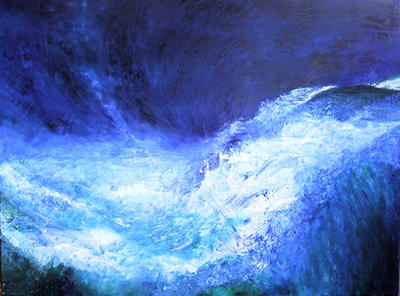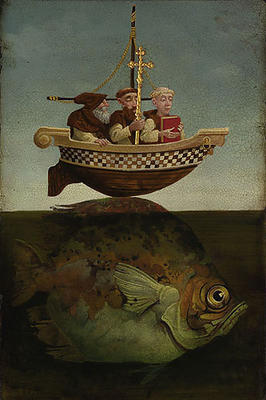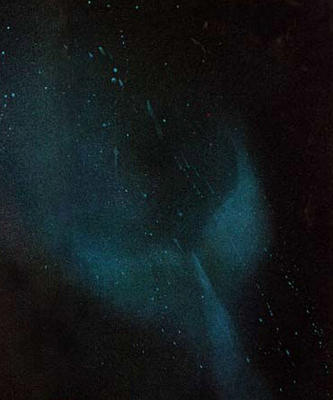Brother of Dark Doors

Can I praise this dark hour enough? Now the black bulb of night burns, hot and swanky, cauling the rooks of my vowels. Dazed crickets or naiads heave an expiring sigh, the sum of all spent lovers.
I live here the darker half of my life, freer now without the boozy mortis of bottomless desire, at home in deep night's animal soak of pleasure and death, the uteral swelling and delving of the moon over our garden outside the window I've opened to wash my every sense. Safe in the emptiness of suburbs, awake in Ophelia's kelp-keep of dreams.
Where are the butterflies at this hour, the ones who dance round the pentas all day in luxuriant petticoats of flame? Drooping from the bellies of orchids perhaps, in the swoon of such lavish summer nakedness, the hush of its slowly rocking tide. Praises to the deepest heaven for this dark bath.
***
"The shadow roots the personality in the subsoil of the unconscious, and this shadowy link with the archetype of the antogonist, i.e. the devil, is in the deepest sense part of the creative abyss of every living personality. This is why in myths the shadow often appears as a twin, for he is just not the "hostile brother," but the companion and friend, and it is sometimes difficult to tell whether this twin is the shadow of the self, the deathless 'other.'
"This paradox bears out the truth of the old law that upper and lower reflect another. In psychological development, the self lies hidden in the shadow; he is the 'keeper of the gate,' the guardian of the threshold. The way to the self lies through him; behind the dark aspect he represents there stands the aspect of wholeness, and only by making friends with the shadow do we gain the friendship of the self."
-- Erich Neuman, The Origins and History of Consciousness
***
The sacred tradition of the tanist or sacrificial alternate is the mythologem of this shadowy gatekeeper.
Graves has it that there is an alternation of kings through the great year, the solar hero Hercules (and Bran, Saturn, and Cronos) sacrificed at midsummer, his spirit floating off in an alder-wood boat. The tanist, or other self, appears (he writes) "in Greek legend as Poeas who lighted Hercules' pyre and inherited his arrows, succeeding him for the second [the "dark"] half of the year; having acquired royal virtue by marriage with the queen, the representative of the White Goddess, and by eating some royal part of the dead man's body --- heart, shoulder or thigh-flesh. He is in turn succeeded by the New Year Hercules, a reincarnation of the murdered man, who beheads him and, apparently, eats his head. This alternate eucharistic sacrifice made royalty continuous, each king being in turn the Sun-god beloved by the reigning Moon-goddess." (The White Goddess, 126-7).
The tanist also appears as the chariot-driver of the Irish hero Cu Chulainn who takes an arrow for his lord. That tanist may be the dark knight who jousted with Amfortas, spearing the Fisher King through the testicles and causing his kingdom to fall into waste.
He is Black Angus MacOdrum the selkie king who laughed and satirized St. Columba on the shores of Iona; he is also also Oran, the monk who offered himself to be buried in the footers of the abbey of St. Columba to appease a water-spirit that had been disturbed.
Shall we travel awhile with St. Oran into that dark moist subsoil?

Photo: Relieg Odhran on Iona, the graveyard at Iona. St. Columba said, "No one may access the angels of Iona but through Oran."
ORAN'S VOYAGE TO THE NORTH
Fiona Macleod (William Sharp), in Iona
It is commonly said that the People of the S“dhe dwell within the hills, or in the underworld. In some of the isles their home, now, is spoken of as Tir-na-thonn, the Land of the Wave, or Tir-fo-Tuinn, the Land under the Sea.
But from a friend, an Islander of Iona, I have learned many things, and among them, that the Shee no longer dwell within the inland hills, and that though many of them inhabit the lonelier isles of the west, and in particular The Seven Hunters, their Kingdom is in the North.
Some say it is among the pathless mountains of Iceland. But my friend spoke to an Iceland man, and he said he had never seen them. There were Secret People there, but not the Gaelic S“dhe.
Their Kingdom is in the North, under the Fir-Chlisneach, the Dancing Men, as the Hebrideans call the polar aurora. They are always young there. Their bodies are white as the wild swan, their hair yellow as honey, their eyes blue as ice. Their feet leave no mark on the snow. The women are white as milk, with eyes like sloes, and lips like red rowans. They fight with shadows, and are glad; but the shadows are not shadows to them. The Shee slay great numbers at the full moon, but never hunt on moonless nights, or at the rising of the moon, or when the dew is falling. Their lances are made of reeds that glitter like shafts of ice, and it is ill for a mortal to find one of these lances, for it is tipped with the salt of a wave that no living thing has touched, neither the wailing mew nor the finned sgAdan nor his tribe, nor the narwhal. There are no men of the human clans there, and no shores, and the tides are forbidden.
Long ago one of the monks of Columba [St. Oran] sailed there. He sailed for thrice seven days till he lost the rocks of the north ; and for thrice thirty days, till Iceland in the south was like a small bluebell in a great grey plain; and for thrice three years among bergs. For the first three years the finned things of the sea brought him food; for the second three years he knew the kindness of the creatures of the air; in the last three years angels fed him. He lived among the Sidhe for three hundred years.
When he came back to Iona, he was asked where he had been all that long night since evensong to matins. The monks had sought him everywhere, and at dawn had found him lying in the hollow of the long wave that washes Iona on the north.
He laughed at that, and said he had been on the tops of the billows for nine years and three months and twenty-one days, and for three hundred years had lived among a deathless people. He had drunk sweet ale every day, and every day had known love among flowers and green bushes, and at dusk had sung old beautiful forgotten songs, and with star-flame had lit strange fires, and at the full of the moon had gone forth laughing to slay. It was heaven, there, under the Lights of the North.
When he was asked how that people might be known, he said that away from there they had a cold, cold hand, a cold, still voice, and cold ice-blue eyes. They had four cities at the four ends of the green diamond that is the world. That in the north was made of earth; that in the east, of air; that in the south, of fire; that in the west, of water. In the middle of the green diamond that is the world is the Glen of Precious Stones. It is in the shape of a heart, and glows like a ruby, though all stones and gems are there. It is there the S“dhe go to refresh their deathless life.
The holy monks said that this kingdom was certainly Ifurin, the Gaelic Hell. So they put their comrade alive in a grave in the sand, and stamped the sand down upon his head, and sang hymns so that mayhap even yet his soul might be saved, or, at least, that when he went back to that place he might remember other songs than those sung by the milk-white women with eyes like sloes and lips red as rowans. "Tell that honey-mouthed cruel people they are in Hell," said the abbot, and give them my ban and my curse unless they will cease laughing and loving sinfully and slaying with bright lances, and will come out of their secret places and be baptized."
They have not yet come.
This adventurer of the dreaming mind is another Oran, that fabulous Oran of whom the later Columban legends tell. I think that other Orans go out, even yet, to the Country of the Sidhe. But few come again. It must be hard to find that glen at the heart of the green diamond that is the world; but, when found, harder to return by the way one came.

TRAVELLER
Today's arrival
at the next
cold shore
finds low coals,
seal bones,
a silver brooch
half buried
in the sand.
And as always
the same scrawled
note found
daggered to a tree.
Island to island
west and north
the search, each
new launch
on darker swells,
unravelling
in Arctic gale.
Whenever I
turn a page
I scan into
those marges,
seeking out
bruised regions
where belief
and desire
are bound,
compassed by
that crashing surf
which beckons
in each recede
a deep salt croon:
not here
not here
not here

COLD SONG
This song is hauled up from a cold well
Nearby -- Oran's, I sense, though
His skull is just the topmost phosphor
In the darkened flow. From this chair
In sleepy Florida I taste
The salt of Hebrides -- brutal,
Male, like iron on the tongue, wild
As the huge rollers which smash
The Orkney coast. I tried this sea-
Chantey strapped to a guitar, but
The roar would not be amped or staged
or spermed in nereid blue. All
that puerile wattage drowned the song.
I threw my guitar down a well.
Oran sings from that falling shell.

ORAN'S SINK
Taurus dracomen genuit
et taurum draco
"The bull is father to the snake
and the snake to the bull"
-- Cretan symbolon
Coin the motions
I bell here a
Doubloon: On one
face blue Oran,
that dark raveller,
his mouth welling
antiphons of primal
cold: Turn the
coin over and you'll
see me in this white
writing chair atop
a treelike esplumoir,
his dark book in one
hand,a gold pen in
the other, writing
down Oran's slither
round and tween
the lines.
I found and fathered
him on this page,
though it is his
words which
engendered all of
mine -- "The way
you think it is is
not the way it is at
all!" -- a truth which
by its unknowableness
is by nature recessional,
bidding all who seek
to travel further down
and cross the page,
island to island,
poem to poem.
I have written down
what I found,
and what I found
has forged this song,
mortaring poem
by poem this
singing house
577
in buried blue.
The mystery is
as simple two
halves of symbolon,
a knucklebone
split in two and
shared by two parties.
One half is shaped by
lines on paper down
to here: The other
half is what lies
inside those lines,
or what comes after
them in a sheer
drop of white space
off the page -- what
I'll never know fully
upside down,
though each next poem
I surely try. Each
day I flip the coin
and watch it rise
then splash and
tumble down in
gold and black
revolvings, articulate
and not, tumbling
line by line down
the shelves of
ancient dark
til it disappears
from sight, surely
to rest at last
in Oran's skull,
atop a pile of
prior poems. That
bowl of bone is coffer
to these coigns which
have no vantage but
their salt surrender,
at home and free to
whirl the sea-god's
sky which only
seems a wetter darker
blue. Suburban
angel of that
winged descent, I
ride this writing
chair astride the
white flanks of a
dolphin with a dragon's
tail and hooves of
raging bull: A modern
man troping
an ancient rage,
illuminating a black
page which only seems
as pale as bone. I
count my words carefully
into that lost half
buried purse at the
bottom of a wishing
well no one may drink:
For every breath
I squander here
here fresh bubbles
rise from Oran's
cathedral sink.
